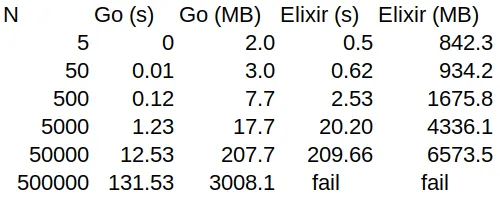在Go语言中,我可以像这样创建goroutine(根据kelu-thatsall的回答进行了编辑):
// test.go
package main
import (
"fmt"
"os"
"strconv"
"sync"
"runtime"
)
func main() {
var wg sync.WaitGroup
if len(os.Args) < 2 {
os.Exit(1)
}
k, ok := strconv.Atoi(os.Args[1])
if ok != nil {
os.Exit(2)
}
wg.Add(k * 1000)
for z := 0; z < k*1000; z++ {
go func(x int) {
defer wg.Done()
fmt.Println(x)
}(z)
if z%k == k-1 {
// @mattn: avoid busy loop, so Go can start processing like BEAM do
runtime.Gosched()
}
}
wg.Wait()
}
在 Go 1.8.0 (64 位) 中的结果:
# shell
$ go build test.go ; for k in 5 50 500 5000 50000 500000; do echo -n $k; time ./test $k > /dev/null; done
5
CPU: 0.00s Real: 0.00s RAM: 2080KB
50
CPU: 0.06s Real: 0.01s RAM: 3048KB
500
CPU: 0.61s Real: 0.12s RAM: 7760KB
5000
CPU: 6.02s Real: 1.23s RAM: 17712KB # 17 MB
50000
CPU: 62.30s Real: 12.53s RAM: 207720KB # 207 MB
500000
CPU: 649.47s Real: 131.53s RAM: 3008180KB # 3 GB
在Erlang或者Elixir中,对应的代码是什么?(根据patrick-oscity的评论进行了编辑)
目前我尝试过的是以下内容:
# test.exs
defmodule Recursion do
def print_multiple_times(n) when n <= 1 do
spawn fn -> IO.puts n end
end
def print_multiple_times(n) do
spawn fn -> IO.puts n end
print_multiple_times(n - 1)
end
end
[x]=System.argv()
{k,_}=Integer.parse(x)
k=k*1000
Recursion.print_multiple_times(k)
在 Elixir 1.4.2(erts-8.2.2)中的结果是:
# shell
$ for k in 5 50 500 5000 50000 ; do echo -n $k; time elixir --erl "+P 90000000" test.exs $k > /dev/null; done
5
CPU: 0.53s Real: 0.50s RAM: 842384KB # 842 MB
50
CPU: 1.50s Real: 0.62s RAM: 934276KB # 934 MB
500
CPU: 11.92s Real: 2.53s RAM: 1675872KB # 1.6 GB
5000
CPU: 122.65s Real: 20.20s RAM: 4336116KB # 4.3 GB
50000
CPU: 1288.65s Real: 209.66s RAM: 6573560KB # 6.5 GB
但我不确定这两者是否等价。它们是吗?
编辑 缩短版本,因为mudasobwa的评论没有给出正确的输出。
# test2.exs
[x]=System.argv()
{k,_}=Integer.parse(x)
k=k*1000
1..k |> Enum.each(fn n -> spawn fn -> IO.puts n end end)
执行结果 for k in 5 50 500 5000 50000 ; do echo -n $k; time elixir --erl "+P 90000000" test.exs $k | wc -l ; done:
5
CPU: 0.35s Real: 0.41s RAM: 1623344KB # 1.6 GB
2826 # does not complete, this should be 5000
50
CPU: 1.08s Real: 0.53s RAM: 1691060KB # 1.6 GB
35062
500
CPU: 8.69s Real: 1.70s RAM: 2340200KB # 2.3 GB
373193
5000
CPU: 109.95s Real: 18.49s RAM: 4980500KB # 4.9 GB
4487475
50000
erl_child_setup closed
Crash dump is being written to: erl_crash.dump...Command terminated by signal 9
CPU: 891.35s Real: 157.52s RAM: 24361288KB # 24.3 GB
因为测试500m需要太长时间,而且+P 500000000参数是进程数错误,所以不会对elixir进行测试。

IO.puts,它仍然比当前的代码快30%,但比你发布的Go数字要慢得多。 - Dogbert1..k |> Enum.each(fn n -> spawn fn -> IO.puts n end end)版本不能正确输出行号,就像第一版Go一样。 - Kokizzu